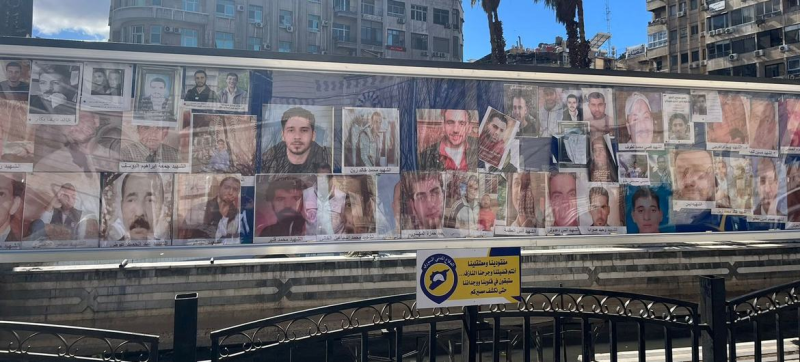- Sustainable, rights-based solutions to Rohingya crisis urged |
- Inqilab Monch Seeks Home Adviser’s Exit |
- UN Calls for Calm in Bangladesh After Protest Leader’s Killing |
- DMP issues 7 traffic directives for Osman Hadi’s Janaza |
- Vested quarter fuelling chaos to impose new fascism: Fakhrul |
UN Commission Praises Syria’s Steps to Address Past Violations

The issue of missing persons in Syria is one of the most prominent humanitarian challenges resulting from years of conflict.
The interim authorities in Syria have taken important steps in recent weeks to address past violations, the Chair of the Independent International Commission of Inquiry on the country said on Friday in an update to the UN Human Rights Council in Geneva.
Paulo Sérgio Pinheiro highlighted the establishment of the National Transitional Authority and the National Authority for Missing Persons, which are expected to help reveal the fate of more than 100,000 Syrians estimated to have been forcibly disappeared or gone missing.
They are also expected to expose the truth about systematic violations such as arbitrary detention, torture, and ill-treatment, as well as widespread attacks that killed hundreds of thousands of civilians and maimed millions during hostilities.
Syria continues along the path to transition following the overthrow of the Assad regime last December.
Mr. Pinheiro said the security vacuum left after the dismissal of the armed forces and security services, together with a lack of clarity on the new justice framework, contributed to an atmosphere where victims of past crimes and violations took the law into their own hands to settle scores.
Retaliatory attacks that took place in coastal areas in March, and on a smaller scale elsewhere, were “in part a response to five decades of systematic crimes perpetrated by security forces with impunity which affected all Syrians,” he said.
“More recently, sectarian fault lines have also been fuelled by widespread hate speech and incitement against Alawis, both offline and online, including posts with false information reportedly often originating from abroad.”
The Commission conducted its latest visit to Syria last week, traveling to several coastal locations where killings and looting occurred. The team met with civil and security authorities, eyewitnesses, and victims’ families.
“First-hand accounts by survivors revealed in detail how residential areas were raided by large groups of armed men, many affiliated with factions now part of the State. They described how assailants detained, ill-treated, and executed Alawis,” he said.
He acknowledged the interim authorities’ establishment of a National Inquiry to investigate violations, as well as an additional High-Level Committee to Maintain Civil Peace. Dozens of alleged perpetrators have also been arrested.
“Protection of civilians is essential to prevent further violations and crimes,” he said.
“We welcome the commitment of President (Ahmed) al-Sharaa to hold those responsible accountable and to restore confidence in State institutions among affected communities.”
He also referred to a deadly attack on a Greek Orthodox church in Damascus last Sunday, stating that authorities must ensure protection of places of worship and threatened communities, and hold perpetrators and enablers accountable.
Mr. Pinheiro told the Council that “the Syrian conflict has faced numerous internal challenges and grievances, many worsened by foreign interventions.”
In recent weeks, Israel has conducted a wave of airstrikes in and around Damascus, including near the presidential palace. Military bases and weapons depots in Daraa, Hama, Tartous, and Latakia were also targeted as part of its sustained military campaign in Syria, with several civilians killed.
Civilian casualties were also reported during Israeli operations in the buffer zone in Quneitra and southwestern Daraa monitored by the UN Disengagement Observer Force (UNDOF).
“These actions raise serious concerns about violations of international human rights and humanitarian law, as UN Secretary-General António Guterres recently stated,” he said.
Mr. Pinheiro reported that more than two million Syrians have returned home since December, including nearly 600,000 from neighbouring countries and just under 1.5 million internally displaced persons (IDPs).
“For many of the over seven million Syrians who remain displaced, massive property-related challenges will need to be addressed following industrial-scale destruction, pillage, and confiscation of homes and lands,” he said.
Despite encouraging steps towards lifting sectoral sanctions and opening the country to new investments, nearly 16.5 million Syrians remain in need of humanitarian assistance, including nearly three million facing severe food insecurity.
Mr. Pinheiro concluded by saying the interim authorities’ repeated commitments to protect the rights of all Syrians without discrimination are encouraging and “should be met with the necessary support from the international community.”
The Independent International Commission of Inquiry on Syria was established by the Human Rights Council in August 2011 with a mandate to investigate all alleged violations of international human rights law since March 2011.
Its members are Mr. Pinheiro and Commissioners Hanny Megally and Lynn Welchman. They are not UN staff and receive no payment for their work.

